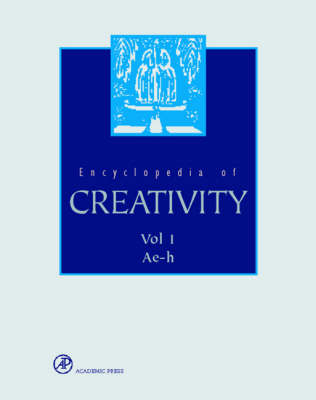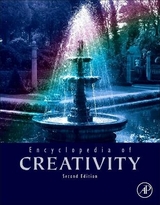
Encyclopedia of Creativity
Academic Press Inc (Verlag)
978-0-12-227075-8 (ISBN)
- Titel erscheint in neuer Auflage
- Artikel merken
The Encyclopedia of Creativity is the sourcebook for individuals seeking specialized information about creativity and motivation. Subjects include theories of creativity, techniques for enhancing creativity, individuals who have made significant contributions to creativity, physiological aspects of creativity, and virtually any topic that touches upon the subject. Entries are placed in alphabetical order with cross-references to other topics and entries where appropriate. Each entry is written in simple easy-to-understand terms summarizing the most important aspects of creative research and writing relating to the specific topic. A bibliography in the back of each article suggests additional sources for more information. The text is visually enhanced throughout by illustrations and photographs.
Mark Runco, Director of Creativity Research & Programming, Southern Oregon University, Ashland OR, USA Mark Runco earned his Ph.D. in cognitive psychology from the Claremont Graduate School in California and has studied creativity ever since. He is currently a Director of Creativity Research & Programming, Southern Oregon University, Ashland OR, USA He began his teaching career as an assistant professor of psychology at the University of Hawaii, Hilo. He then taught at Cal State Fullerton for 22 years. He was also an adjunct professor at the Norwegian School of Economics and Business Administration for nearly 15 years and lectured regularly at Universidad de Cantabria in Spain and Shaanxi Normal University in Xi'an, China. He is a distinguished consulting faculty member at the Saybrook Graduate University in San Francisco and remains on the University of Georgia Graduate Faculty Mark developed nine seminars on creativity, including "Creativity: What It Is and What It Is Not," "The Assessment of Creativity," "Creative Cognition," and "Social Contexts for Creativity." He is Fellow and past president of Division 10 (Psychology, Art, Creativity, and Aesthetics) of the American Psychological Association. Mark also founded the Creativity Research Journal, which he still edits, along with two new journals: Business Creativity and the Creative Economy, and the Journal of Genius and Eminence. In 2010, Mark published the "rCAB" (Runco Creativity Assessment Battery), a comprehensive battery of tests for the assessment of creativity. He has published over 300 articles, chapters, and books on creativity, its measurement and enhancement. His textbook Creativity: Theories and Themes: Research, Development, and Practice has been translated into 10 languages. The 3rd edition will be published in 2020. He also was an Editor-in-Chief of the Encyclopedia of Creativity, which was published in 1999 and the second edition, which was published in 2011. Steven Pritzker, Psychology/Creativity Studies Faculty, Saybrook University, Pasadena, CA, USA Steven Pritzker received his Ph.D.in Educational Psychology from the University of Southern California. He taught Writing and Creativity and Writing at UCLA Extension and Foothill College and Educational Psychology at USC. Steven was a Professor for 17 years at Saybrook University where he founded and was Director of the Creativity Studies Certificate and the Creativity Studies Masters and Doctoral Specializations. He is still on the faculty there and has guest lectured at universities and spoken at conferences in many countries. Steven’s research has dealt with creativity and writing in television; collaborative creativity in writing and business; creativity and spirituality; audience flow; the effect of alcohol on creativity; comedians and longevity and the creative process in high achieving writers. Dr. Pritzker is Past President a Fellow of Division 10 of The American Psychological Association (Psychology of Creativity, Aesthetics and The Arts). He also served on the Educational Coalition of the American Psychological Association where he was commissioned to be Executive Producer of the video Creativity in the Classroom which is among the top ten most viewed videos released by APA. He also developed this into a Continuing Education Module for psychologists and teachers. Steven worked in network television where he was a Writer and/or Executive Story Editor, Producer, Supervising Producer or Executive Producer on over 200 network television shows. His credits include writing episodes of the Emmy winning Mary Tyler Moore Show and Room 222. He is a lifetime member of the Writers Guild of America. His background in the business world includes experience in marketing, advertising, training, and consulting. He has presented seminars regarding business and creativity. Steven was Humor Editor and a write for Psychology Today magazine and Editor-in-Chief of the first edition of The Encyclopedia of Creativity published in 1999 as well as the second edition published in June 2011.
J. Nemiro, Acting.L.M. Cohen and D. Ambrose, Adaptation and Creativity.S.E. Moriarty and B.A. Robbs, Advertising.R. Richards, Affective Disorders.B. Levy and E. Langer, Aging.S.R. Pritzker, Alcohol and Creativity.S. Krippner, Altered and Transitional States.M.D. Mumford and P.P. Porter, Analogies.S.Z. Dudek, Architecture, Modern Western.E. Taylor, Archival Investigation.S.Z. Dudek, Art and Aesthetics.C. Martindale, Art and Artists.A. Rothenberg, Articulation.T. Proctor, Artificial Intelligence.D. Fasko, Jr., Associative Theory.G. Toplyn, Attention.J. Kasof, Attribution and Creativity.G.J. Feist, Autonomy and Independence.G.A. Davis, Barriers to Creativity and Creative Attitudes.R. Epstein and G. Laptosky, Behavioral Approaches to Creativity.M.E. Gorman, Bell, Alexander Graham.F.J. Sulloway, Birth Order.N. Jausovec, Brain Biology and Brain Functioning.K.H. Pribram, Brain and the Creative Act.T. Rickards, Brainstorming.J. VanTassel-Baska, Brontë Sisters.C.M. Ford, Business Strategy.D. Morrison, Carroll, Lewis.P. Machotka, Cezanne, Paul.D. Schuldberg, Chaos Theory and Creativity.O. Martinsen and G. Kaufmann, Cognitive Style and Creativity.J. Abra and G. Abra, Collaboration and Competition.T.I. Lubart, Componential Models.T. Proctor, Computer Programs.J. Dacey, Concepts of Creativity: A History.D.M. Harrington, Conditions and Settings/Environment.K.M. Sheldon, Conformity.B.A. Hennessey and T.M. Amabile, Consensual Assessment.R.R. McCrae, Consistency of Creativity across the Life Span.M.A. Runco, Contrarianism.D.A. Pariser, Conventionality.C.M. Ford, Corporate Culture.D.K. Carson, Counseling.G. Ekvall, Creative Climate.K. O'Quin and S.P. Besemer, Creative Products.B. Cramond, Creativity in the Future.M.L. Grisanti and H.E. Gruber, Creativity in the Moral Domain.I. Magyari-Beck, Creatology.R. Brower, Crime and Creativity.M.A. Runco, Critical Thinking.M.K. Raina, Cross-Cultural Differences.B.J. Thurston, Curie, Marie Sklodowska.J.B. Alter, Dance and Creativity.R.B. McLaren, Dark Side of Creativity.R. T. Keegan, Darwin, Charles Robert.L. Shlain, da Vinci, Leonardo.A.J. Cropley, Definitions of Creativity.G. Goldschmidt, Design.M.A. Runco, Developmental Trends in Creative Abilities and Potentials.J.A. Plucker and M.A. Runco, Deviance.B. Yan and P. Arlin, Dialectical Thinking: Implications for Creative Thinking.S.L. Morrison, Dinesen, Isak.R. Root-Bernstein, Discovery.H.J. Walberg and G. Arian, Distribution of Creativity.M.A. Runco, Divergent Thinking.G.B. Esquivel and K.M. Peters, Diversity, Cultural.J. Baer, Domains of Creativity.S. Krippner, Dreams and Creativity.J.A. Plucker and R.Q. Dana, Drugs and Creativity.D.J. Weeks and K. Ward, Eccentricity.T.I. Lubart and M.A. Runco, Economic Perspective on Creativity.A.J. Cropley, Education.A.I. Miller, Einstein, Albert.D.K. Simonton, Eminence.S.W. Russ, Emotion/Affect.J.A. Plucker and M.A. Runco, Enhancement of Creativity.S.K. Sagarin and H.E. Gruber, Ensemble of Metaphor.R. Richards, Everyday Creativity.H.E. Gruber, Evolving Systems Approach.K.A. Ericsson and A.C. Lehmann, Expertise.B. Kerr and C. Chopp, Families and Creativity.R. Richards, Five-Part Typology.R.A. Dodds and S.M. Smith, Fixation. B.J. Thurston and M.A. Runco, Flexibility.R. Richards, Four Ps of Creativity.M.A. Runco, Fourth Grade Slump.A.C. Elms, Freud, Sigmund.J. Baer, Gender Differences.R. Epstein, Generativity Theory.C. Martindale, Genetics.J.F. Feldhusen, Giftedness and Creativity.P.B. Paulus, Group Creativity.W.B. Michael, Guilford's View.W.D. TenHouten, Handwriting and Creativity.M.D. Mumford and D.G. Norris, Heuristics.D.K. Simonton, Historiometry.C. Martindale, History and Creativity.A.G. Rothenberg, Homospatial Process.A.G. Aleinikov, Humane Creativity.K. O'Quin and P. Derks, Humor.J.C. Houtz and C. Patricola, Imagery.J.L. Singer, Imagination.M.A. Runco, Implicit Theories.R.K. Sawyer, Improvisation.S.M. Smith and R.A. Dodds, Incubation.M.A. West and T. Rickards, Innovation.R.J. Sternberg and J.E. Davidson, Insight.R. Helson, Institute of Personality Assessment and Research.R.J. Sternberg, Intelligence.E. Policastro, Intuition.M. Hertz, Invention.A. Rothenberg, Janusian Process.K. Jones, Jungian Theory.T.E. Scott, Knowledge.F.L. Holmes, Krebs, Hans Adolf.M.D. Mumford and M.S. Connelly, Leadership.L.A. O'Hara and R.J. Sternberg, Learning Styles.P.N. Johnson-Laird, Logic and Reasoning.R.F. Subotnik and K.D. Arnold, Longitudinal Studies.S.D. Durrenberger, Mad Genius Controversy.M. Dogan, Marginality.D.K. Simonton, Matthew Effects.E. Necka, Memory and Creativity.N. Jausovec, Metacognition.R.W. Gibbs, Jr., Metaphors.M.C. Moldoveanu and E. Langer, Mindfulness.M.A. Runco, Misjudgment.E.R. Hirt, Mood.R. Conti and T. Amabile, Motivation/Drive.A. Ione, Multiple Discovery.B. Solomon, K. Powell, and H. Gardner, Multiple Intelligences.M. Leman, Music.P.D. Stokes, Novelty.T. Zausner, O'Keeffe, Georgia.M.S. Lindauer, Old Age Style.T. Rickards, Organizations Interested in Creativity.M.M. Piechowski, Overexcitabilities.T. Nickles, Paradigm Shifts.G.J.W. Smith, Perceptgenesis.G.C. Cupchik, Perception and Creativity.R. Helson, Personality.M.A. Runco, Perspectives.B.D. Esgalhado, Pessoa, Fernando.H.E. Gruber, Piaget, Jean.D. Lester, Plath, Sylvia.J.L. Dansky, Play.J. Piirto, Poetry.J.A. Seitz, Political Science and Creativity.G.R. Brown, Postmodernism and Creativity.T.E. Heinzen, Proactive Creativity.M.A. Runco and G. Dow, Problem Finding.R.E. Mayer, Problem Solving.M.J. Morelock and D.H. Feldman, Prodigies.R. Root-Bernstein, Productivity and Age.S.J. Parnes, Programs and Courses in Creativity.A.N. Katz, Psycholinguistics.A. Goswami, Quantum Theory of Creativity.D. Schuldberg and L.A. Sass, Schizophrenia.L. Deschamps Otswald, Schumann, Robert.K. Dunbar, Science.M.A. Runco, Self-Actualization.P. Wink, Self Processes and Creativity.C.L. Diaz de Chumaceiro, Serendipity.C. Sanguinetti and S. Kavaler-Adler, Sexton, Anne.D.K. Simonton, Shakespeare, William.L. Tahir, Shaw, George Bernard.J. Bogen and G.M. Bogen, Split Brains: Interhemispheric Exchange in Creativity.J. Abra and G. Abra, Sports and Creativity.D. Lester, Suicide.J. Piirto, Synchronicity.G. Domino, Synesthesia.K. Rathunde, Systems Approach.M.A. Runco, Tactics and Strategies for Creativity.M.K. Raina, Tagore, Rabindranath.J. Feldhusen, Talent and Creativity.R.E. Ripple, Teaching Creativity.G.J. Puccio, Teams.P.M. Valkenburg, Television and Creativity.M.A. Runco, Time.D. Pariser, Toulouse-Lautrec, Henri de.L. Noppe, Unconscious.R. Brower, van Gogh, Vincent.N. Gajdamaschko, Vygotsky, Lev Semenovich.S.M. Reis, Women and Creativity.M. Ippolito, Woolf, Virgina.L.R. Jeffrey, Wordsworth, William.P.L. Jakab, Wright, Wilbur and Orville.S.R. Pritzker, Writing and Creativity.L. Shlain, Zeitgeist.S.R. Pritzker, Zen.M.A. Runco, Appendix I: Chronology of Events and Significant Ideas and Works on Creativity.M.A. Runco, Appendix II: Tests of Creativity.Contributors.Name Index.Subject Index.
| Erscheint lt. Verlag | 9.8.1999 |
|---|---|
| Mitarbeit |
Chef-Herausgeber: Steven R. Pritzker |
| Verlagsort | San Diego |
| Sprache | englisch |
| Maße | 216 x 279 mm |
| Gewicht | 4900 g |
| Themenwelt | Schulbuch / Wörterbuch ► Lexikon / Chroniken |
| Geisteswissenschaften ► Psychologie ► Allgemeine Psychologie | |
| Geisteswissenschaften ► Psychologie ► Verhaltenstherapie | |
| ISBN-10 | 0-12-227075-4 / 0122270754 |
| ISBN-13 | 978-0-12-227075-8 / 9780122270758 |
| Zustand | Neuware |
| Informationen gemäß Produktsicherheitsverordnung (GPSR) | |
| Haben Sie eine Frage zum Produkt? |
aus dem Bereich



